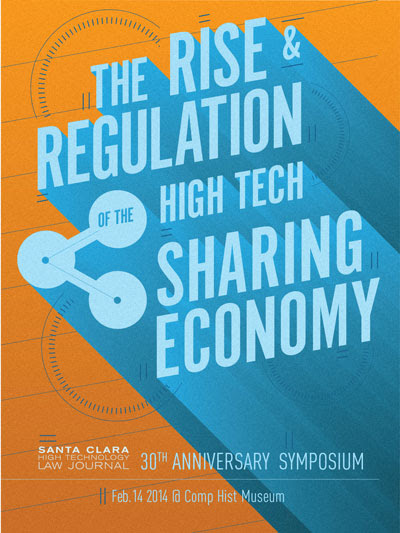
Regulating and Lawyering for Social-Economy Companies
Feb. 14 Event Sponsored by Santa Clara University’s High Tech Law Journal Will Explore the Intersection of Privacy, Regulation, and the Social Economy
SANTA CLARA, Calif., Feb. 4, 2014— Bitcoin. Uber. AngelList. Twitter.
Each of these tech companies raises significant legal and regulatory questions unheard of only a few years ago, ranging from how to regulate virtual money to how to translate real-world securities regulation to crowdfunding startups.
This Valentine’s Day, Feb. 14, the Santa Clara High Tech Law Journal will bring together prominent scholars, policy makers, practitioners, and entrepreneurs to discuss The Rise and Regulation of the High Tech Sharing Economy.
The event will take place Feb. 14, from 9 a.m. to 3 p.m. at the Computer History Museum in Mountain View, Calif. The agenda is at symposium.htlj.org. Topics will include:
*regulation of software-enabled ride sharing
*privacy as a feature of service
*potential security threats and abuses for social commerce companies such as Bitcoin
*lessons learned from recent SEC opinions on crowdfunding for angel investing.
Reporters are invited to attend by RSVPing to Deborah Lohse of SCU Media Relations at dlohse@scu.edu.
The conference program will focus on the “innovation of regulation” and how lawyers can navigate regulatory structures and participate in the drafting of new government policy for disruptive businesses like car sharing and crowdfunding.
Over two sessions, six keynote speakers will present and participate in Q&As.
Speakers will include:
*California Public Utilities Commissioner Catherine Sandoval, on the implications of software-enabled ride sharing, and some of the controversy it is causing among traditional taxi services, as well as privacy policy and the Commission’s function as an authority in setting privacy standards.
*Jeffrey Rabkin, California Special Assistant Attorney General for Law and Technology, on how the Attorney General’s office is balancing innovation, access, and security for Internet-enabled companies, including Bitcoin and privacy liability.
*Shannon Spanhake, San Francisco Deputy Innovation Officer, on how Mayor Ed Lee and his office are working with Internet-enabled businesses to promote innovation, accountability, and accessibility and help the government achieve community goals.
*Corey Owens, head of global public policy at Uber, on Uber’s efforts to challenge traditional regulation and how they are promoting public safety.
*Kevin Laws, COO of AngelList, on his experience working with local governments and the SEC to define new legal standards for crowdfunding, and how the web has changed the context and meaning of consumer-focused investment.
*Laura Pirri, legal director for products at Twitter, on key decisions Twitter has made to systematically build privacy into their product.
To register for the 2014 High Tech Law Journal Symposium, please visit symposium.htlj.org, where you can find more information about the event. Attendance is limited.
The Santa Clara High Tech Journal is celebrating its 30th year as a progressive legal publication offering a unique forum to explore emerging issues and challenges facing computer and high tech law. For questions about the Symposium, please contact Nicole Shanahan at Nicole.Shanahan@htlj.org.
About the High Tech Law Journal
The High Tech Law Journal at Santa Clara is a student-run organization that has become one of the most prominent publishers of high-tech-related legal research and commentary in the country. Over its 30-year history, the Journal has built an impressive academic audience, and provides law student associates and editors with a chance to contribute directly to articles and publications that will shape the leading edge of policy, regulation, and jurisprudence.
Media Contact
Deborah Lohse | SCU Media Relations | dlohse@scu.edu | 408-554-5121